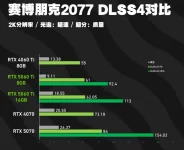The RTX 5060 Ti comes in two versions - an 8GB model that costs $379 and a 16GB version priced at $429. Most reviewers received the 16GB cards first, leaving the 8GB variant less covered in the media. Some tech outlets purchased their 8GB cards independently for testing purposes. A comparison from the Carbon-based Technology Research Institute on Bilibili tested both versions using ASUS models.
Regular gaming performance appeared similar between the two cards. The differences emerged during DLSS 4 with Multi-Frame Generation tests, where the 16GB model significantly outperformed its smaller counterpart. In Cyberpunk 2077, the 8GB RTX 5060 Ti actually performed worse than the previous generation RTX 4060 Ti with equal memory at native 1440p resolution. Even with Multi-Frame Generation enabled, the 8GB model lagged behind the 16GB version by 22 percent.
Multiple reviews confirmed these findings. The extra $50 for the 16GB model delivers better performance, especially at higher resolutions. The 8GB card handles most current games adequately but struggles with demanding technologies like DLSS 4. For long-term use, the 16GB version offers more future-proofing as games become increasingly memory-intensive.
Regular gaming performance appeared similar between the two cards. The differences emerged during DLSS 4 with Multi-Frame Generation tests, where the 16GB model significantly outperformed its smaller counterpart. In Cyberpunk 2077, the 8GB RTX 5060 Ti actually performed worse than the previous generation RTX 4060 Ti with equal memory at native 1440p resolution. Even with Multi-Frame Generation enabled, the 8GB model lagged behind the 16GB version by 22 percent.
Multiple reviews confirmed these findings. The extra $50 for the 16GB model delivers better performance, especially at higher resolutions. The 8GB card handles most current games adequately but struggles with demanding technologies like DLSS 4. For long-term use, the 16GB version offers more future-proofing as games become increasingly memory-intensive.












